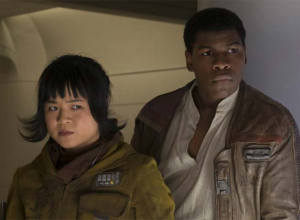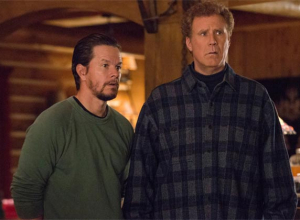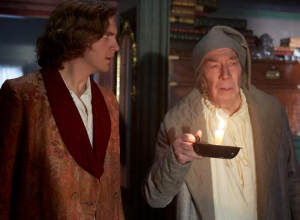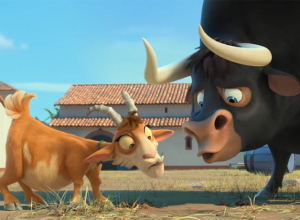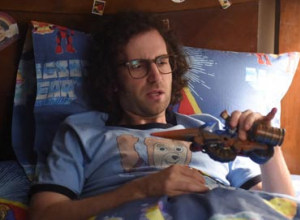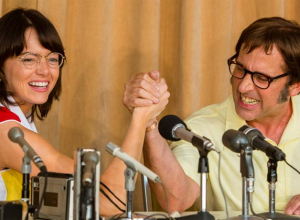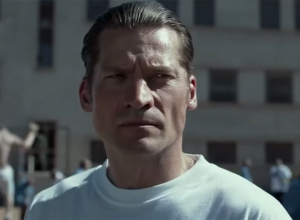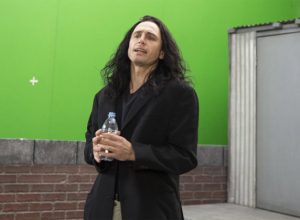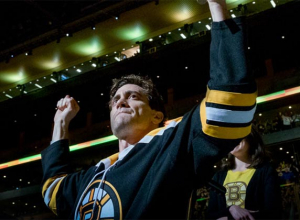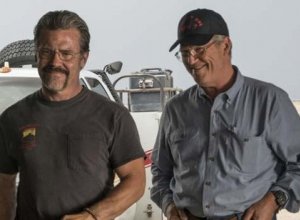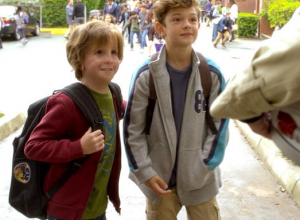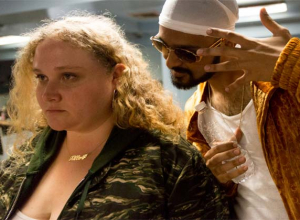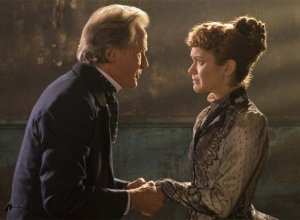Raging Bull Review
By Jay Antani
The film charts the life and career of boxer Jake LaMotta (Robert De Niro) from his rise to glory in the 1940s to his fall into washed-up grotesquery in the '50s, a lounge lizard parody of his former self. That LaMotta turns into the very sort of schmuck, fat-bellied and dissipated, that he would've abhorred in his youth marks one of Scorsese's most poignant treatments of his trademark theme of the individual struggling to transcend his worst instincts to achieve greatness and grace. Anger and bitterness are ever-present here, either churning at the film's surface or roiling just below in slow burn. LaMotta, the insecure hothead who chafes at the underworld hoods who've ensnared him, directs his rage outward in the form of sexual jealousy at his wife, Vickie (Cathy Moriarty), and through his tornado-like fury in the ring. The boxer's battle for self-acceptance even threatens the most meaningful and enduring relationship he's got, the one with his brother and manager, Joey (Joe Pesci); indeed, Raging Bull is, to a large extent, about the effect of blind ambition on our most meaningful, enduring relationships.
In praise of Satyajit Ray's Apu Trilogy, Scorsese once observed how Ray shot like De Sica, the Neo-realist, but cut like Eisenstein, the high priest of Soviet montage. Raging Bull reveals a formal dialectic almost identical to Ray's cinema. Like its forerunners Mean Streets and Taxi Driver, the film is suffused with Scorsese's fever-dream nostalgia; the soundtrack is often muted but always humming with Italian music from tenement radios and the humdrum of New York's street life -- enriching the authenticity of the film's images. Its streetwise realism feels more akin to John Cassavetes' than to DeSica's (and Ray's) pastorals. But the film's on-action cutting and knife-edged compositions give it an urgency first forged by the Soviets, which drives forward the lyricism in Scorsese's story-world just as it did in Ray's. For good measure, Scorsese -- ever the passionate cinema purveyor -- cloaks his boxing halls in chiaroscuro, giving it the same luridness and mystery that steeped Citizen Kane, Hollywood's most notorious and celebrated study in broken identity.
Raging Bull reveals an artist with the savage heart of a fighter, one as boldly adventurous with the tools of his trade as LaMotta was with his own bloodied ropes and canvases. In its mastery of technique, the film is an homage to everything Scorsese had learned and absorbed thus far, all at the service of absolutely personal filmmaking. For Raging Bull is as much about Scorsese confronting a world he contended with intimately growing up as it is about LaMotta confronting his own inner demons. The one-two punch of Michael Chapman's cinematography and Thelma Schoonmaker's editing -- both sublime and in which every optical trick is managed either in-camera or on the flatbed -- combine to jolt Scorsese's intimate touches and to form a cinematic experience as exhilarating as anything in this post-Matrix age of over-digitized action.
For all its technical virtuosity, Raging Bull connects on primal themes. Mardik Martin and Paul Schrader's script is rooted in the contrary pulls of lust and redemption. While the film is paced ploddingly -- a recurring symptom in many of Scorsese's works -- it gains its footing in the cumulative power of its individual scenes. And this power is not derived solely from Scorsese but from on-target performances from Pesci, Moriarty and, of course, De Niro. Watching De Niro's legendary work, in fact, it's clear that the film was as much an occasion for his own transcendence as it was for the director.
Raging Bull ends with a dedication to Haig P. Manoogian, Scorsese's mentor at NYU, and it gives proof of the film's significance to Scorsese's canon. The dedication itself is a New Testament excerpt citing the testimony of the newly sighted man before the Pharisees, and it signs off with the words, "With love and resolution, Marty." Indeed, Raging Bull is "resolution" embodied, both in the go-for-broke spirit in which it was made and for what it signified for Scorsese personally: the consummation of his artistic identity and of themes he continues to explore and elaborate on to this day.
The long-awaited DVD is a set to remember, two discs packed with goodies for the fan of Raging Bull. The film itself features three commentary tracks, while a second disc offers four behind-the-scenes featurettes, a making-of documentary, comparisons with actual LaMotta fights, and newsreel footage of LaMotta at work in the ring.
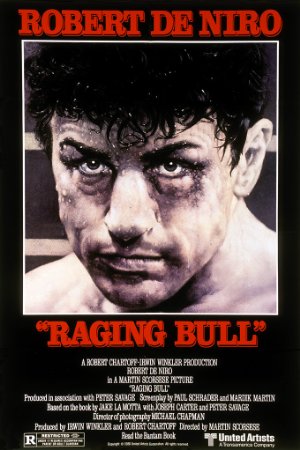
Facts and Figures
Year: 1980
Genre: Dramas
Run time: 129 mins
In Theaters: Friday 19th December 1980
Box Office Worldwide: $23M
Budget: $18M
Distributed by: United Artists
Production compaines: United Artists
Reviews
Contactmusic.com: 5 / 5
Rotten Tomatoes: 98%
Fresh: 58 Rotten: 1
IMDB: 8.3 / 10
Cast & Crew
Director: Martin Scorsese
Producer: Robert Chartoff, Irwin Winkler
Screenwriter: Paul Schrader, Mardik Martin
Starring: Robert De Niro as Jake La Motta, Joe Pesci as Joey La Motta, Cathy Moriarty as Vickie Thailer, Frank Vincent as Salvy Batts, Nicholas Colasanto as Tommy Como, Theresa Saldana as Lenore, Mario Gallo as Mario
Also starring: Robert Chartoff, Irwin Winkler, Paul Schrader, Mardik Martin
